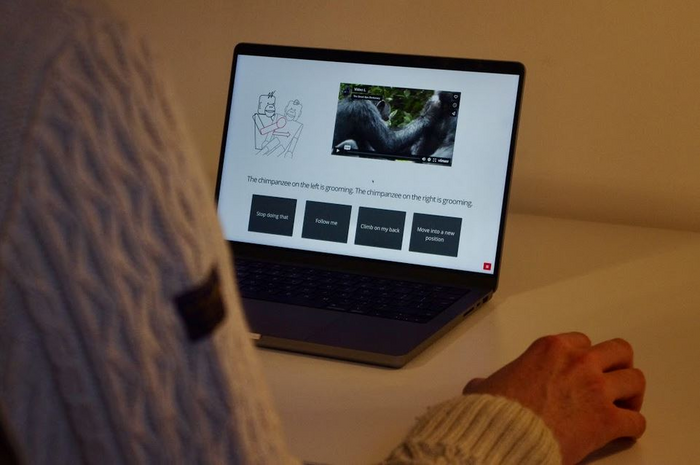Humans retain an understanding of gestures made by other great apes, even though we no longer use them ourselves, according to a study by Kirsty E. Graham and Catherine Hobaiter at the University of St Andrews, Scotland, publishing January 24th in the open access journal PLOS Biology.

Credit: Kirsty E. Graham (CC-BY 4.0, https://creativecommons.org/licenses/by/4.0/)
Humans retain an understanding of gestures made by other great apes, even though we no longer use them ourselves, according to a study by Kirsty E. Graham and Catherine Hobaiter at the University of St Andrews, Scotland, publishing January 24th in the open access journal PLOS Biology.
The discovery of gestures used by great apes provided the first evidence of intentional communication outside human language, and over 80 such signals have now been identified. Many of these gestures are shared across non-human apes, including distantly related apes such as chimpanzees and orangutans. However, despite humans being more closely related to chimpanzees and bonobos, these ape gestures are no longer thought to be present in human communication.
Researchers tested people’s understanding of the 10 most common gestures used by chimpanzees (Pan troglodytes) and bonobos (Pan paniscus) using an online game. Over 5,500 participants were asked to view 20 short videos of ape gestures and select the meaning of the gesture from four possible answers. They found that participants performed significantly better than expected by chance, correctly interpreting the meaning of chimpanzee and bonobo gestures over 50% of the time. Providing participants with contextual information about what the apes in the video were doing only marginally increased their success rate in interpreting the meaning of the gesture.
Video playback experiments have traditionally been used to test language comprehension in non-human primates, but this study reversed the paradigm to assess humans’ abilities to understand the gestures of their closest living relatives for the first time. The results suggest that although we no longer use these gestures, we may have retained an understanding of this ancestral communication system. The authors say that it remains unclear whether our ability to understand specific great ape gestures is inherited, or whether humans and other great apes share an ability to interpret meaningful signals because of their general intelligence, physical resemblance, and similar social goals.
The authors additionally include a link where people can take a quiz version of the experiment (no data are collected): https://research.sc/participant/login/dynamic/505CF355-CEF5-44ED-B2F1-2CBA484BD2FA
Graham adds, “All great apes use gestures, but humans are so gestural – using gestures while we speak and sign, learning new gestures, pantomiming etc. – that it’s really hard to pick out shared great ape gestures just by observing people. By showing participants videos of common great ape gestures instead, we found that people can understand these gestures, suggesting that they may form part of an evolutionarily ancient, shared gesture vocabulary across all great ape species including us.”
#####
In your coverage, please use this URL to provide access to the freely available paper in PLOS Biology: http://journals.plos.org/plosbiology/article?id=10.1371/journal.pbio.3001939
Citation: Graham KE, Hobaiter C (2023) Towards a great ape dictionary: Inexperienced humans understand common nonhuman ape gestures. PLoS Biol 21(1): e3001939. https://doi.org/10.1371/journal.pbio.3001939
Author Countries: United Kingdom
Funding: This research received funding from the European Union’s 8th Framework 287 Programme, Horizon 2020, under grant agreement no 802719 to CH (https://ec.europa.eu/info/research-and-innovation/funding/funding-opportunities/funding-programmes-and-open-calls/horizon-2020_en). This work was supported by Gorilla Awards in Behavioural Science who provided the Gorilla.sc licensing fee and an unlimited participant award to KG (https://gorilla.sc/). The funders had no role in study design, data collection and analysis, decision to publish, or preparation of the manuscript.
Journal
PLoS Biology
DOI
10.1371/journal.pbio.3001939
Method of Research
Experimental study
Subject of Research
Animals
COI Statement
Competing interests: The authors have declared that no competing interests exist.




